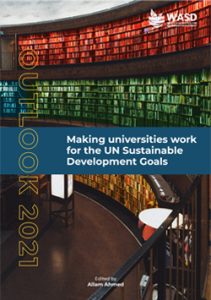The Yale-Sudan Partnership: Supporting Research Leadership Among Junior to Mid-Career Faculty, Dr. Erika Linnander, Dr. Mayur Desai, Dr. Saria Hassan, Nukte Goc, Prof. Ibrahim Bani
Dr. Erika Linnander
Yale Global Health Leadership Initiative, New Haven, CT
United States
Email: erika.linnander@yale.edu
Dr. Mayur Desai
Yale Global Health Leadership Initiative, New Haven, CT
United States
Email: mayur.desai@yale.edu
Dr. Saria Hassan
Emory University School of Medicine, Atlanta, GA, United States
College of Medicine &Centre of Medical and Bio allied Health Sciences Research, Ajman University, United Arab Emirates
Email: saria.hassan@emory.edu
Nukte Goc
Yale Global Health Leadership Initiative, New Haven, CT
United States
Email: nukte.goc@yale.edu
Prof. Ibrahim Bani
College of Medicine & Centre of Medical and Bio allied Health Sciences Research, Ajman University
United Arab Emirates
Email: i.bani@ajman.ac.ae
 Background: Given Sudan’s limited progress toward its 2030 Sustainable Development Goals, there is an urgent need to improve multiple levels of public health, including the public health workforce. Accordingly, strengthening public health education has been prioritized by Sudan’s Ministries of Health and Higher Education. Since late 2018, Yale University (US) has developed partnerships with five of Sudan’s leading educational institutions (Ahfad University for Women, University of Gezira, University of Khartoum, Neelain University, and the Public Health Institute of Sudan) and the Ministry of Health (MoH) to strengthen graduate public health education in Sudan. Here, we describe the Yale-Sudan Program for Research Leadership (delivered between June and December 2021). The program seeks to foster a network of junior- to mid-level faculty with the ability to assume leadership roles within their institutions, generating research that will influence policy and practice in Sudan and serving as more effective mentors to the next generation of public health professionals.
Background: Given Sudan’s limited progress toward its 2030 Sustainable Development Goals, there is an urgent need to improve multiple levels of public health, including the public health workforce. Accordingly, strengthening public health education has been prioritized by Sudan’s Ministries of Health and Higher Education. Since late 2018, Yale University (US) has developed partnerships with five of Sudan’s leading educational institutions (Ahfad University for Women, University of Gezira, University of Khartoum, Neelain University, and the Public Health Institute of Sudan) and the Ministry of Health (MoH) to strengthen graduate public health education in Sudan. Here, we describe the Yale-Sudan Program for Research Leadership (delivered between June and December 2021). The program seeks to foster a network of junior- to mid-level faculty with the ability to assume leadership roles within their institutions, generating research that will influence policy and practice in Sudan and serving as more effective mentors to the next generation of public health professionals.
Methods: The fully virtual research program, funded by the United States Embassy in Sudan, is based on an evidence-based program that the Yale Global Health Leadership Initiative (GHLI) has successfully implemented in other low- and middle-income countries. Participants were nominated by the Deans and directors of the partner institutions, and each participant identified a champion within their institution who would help guide their career development. A coordinator at each institution facilitated adaptation of the program to the Sudanese context and ensured communication with the participants. The program is comprised of 4 modules: (1) Creating the leadership network; (2) Fostering mentorship; (3) Leading research teams; and (4) Supporting scientific writing. Modules included synchronous weekly interactive sessions facilitated by GHLI faculty, panel discussions featuring Sudanese experts from within Sudan and across the diaspora, and readings and assignments managed using CanvasTM (Yale’s online learning platform). Participants who completed course requirements earned a certificate and were eligible to participate in a mentored scientific writing collaborative toward publication in a peer-reviewed journal. The program was evaluated using the Kirkpatrick model, including (1) participant retention, engagement, and satisfaction (based on program records and satisfaction surveys), (2) change in individual competency (based on pre-post self-assessments of mentorship and leadership competencies, using previously validated scales, and (3) translation of skills into action (based on assignments).
Results: A total of 29 participants (with 20 champions) enrolled, including 8 (28%) men and 21 (72%) women. At the completion of the first two modules, 75% of participants had met the participation requirements, including reliable engagement in live sessions despite connectivity challenges and full-time workloads. A feedback survey at the end of the first module showed that 100% of respondents (n=23) would “definitely recommend” the program to peers, and most respondents were confident in their progress toward the learning objectives of the program. The longitudinal self-assessment of leadership and mentorship skills is underway, and results will be provided at the time of the conference.
Conclusion: The program fostered collaboration among US and Sudanese institutions and engaged public health professionals and scholars from the Sudanese diaspora. Effective support to junior to mid-level faculty is expected to have tangible and sustained impact on the pipeline of public health professionals, and on the ability of Sudanese scholars to align their research with the priorities of the MoH to improve the overall health of the country. Lessons learned from the adaptation, implementation, and evaluation of the program have implications for plans to extend the program to other Sudanese universities and to complement the program with future approaches to strengthen public health education.

